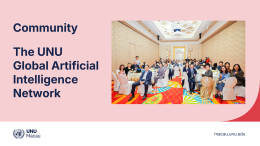The 2024 ACUNS Annual Meeting, cohosted at the United Nations University and the University of Tokyo, convened from June 20-22 to address the theme “Global Governance and Sustainable Development: Revitalizing Research to Support Multilateral Solutions.” The meeting encompassed numerous sessions exploring different aspects of the theme, including a roundtable entitled “It Takes a Village to Raise GenAI: Exploring GenAI’s Impacts on Education and Research.”
Chaired by Jingbo Huang (UNU Macau), the session featured a panel of experts, including Francesco Foghetti (UNU Centre), Jonghwi Park (UNU-IAS), Mark Ray and Stephen Ta’Bois (Government of Cayman Islands), and Antonios Saravanos (New York University). This is Part 5 of the series.
Previous blog posts of this series:
Part 1 It Takes a Village to Raise GenAI: Exploring GenAI’s Impacts on Education and Research
Part 2 It Takes a Village to Raise GenAI: Insights from the Cayman Islands Education Sector
The rise of Generative Artificial Intelligence (GenAI) offers transformative possibilities across various sectors, including the work of international organizations like the United Nations (UN). However, in a global governance setting, deploying GenAI tools brings with it a series of legal and ethical challenges that must be carefully considered.
Legal Considerations of GenAI in the UN Context
Navigating an Evolving Regulatory Landscape
The global regulatory framework for GenAI is in its infancy, with many countries being in the initial stages of developing frameworks for its governance. Meanwhile, the rapid pace of technological advancements often outpaces these regulations, rendering them quickly outdated. As a result, UNU has adopted a cautious stance on GenAI implementation.
Adherence to Ethical Frameworks
While UNU supports the use of GenAI, it emphasizes adherence to ethical guidelines. Key frameworks include the "Principles for the Ethical Use of Artificial Intelligence in the United Nations System" and the "UNESCO Recommendations on the Ethics of Artificial Intelligence." These documents outline the importance of ethical considerations such as transparency, accountability, and human rights in the deployment of GenAI.
Key Legal Concerns
Several specific legal issues stand out when considering GenAI in a UN setting:
- Accuracy and Reliability: Ensuring GenAI outputs are reliable is essential, especially when these outputs could influence decisions that affect global policy or public trust.
- Data Privacy and Protection: GenAI systems often handle sensitive personal data, raising concerns about compliance with data protection laws and the need to maintain privacy, which is crucial for building trust.
- Intellectual Property Rights (IPR): The question of who owns GenAI-generated content is legally ambiguous. Determining rights and ownership of such content is one of the more complex challenges in deploying this technology.
- Information Security: GenAI systems must be protected from cyber threats and unauthorized access to safeguard the integrity of UN operations.
- Compliance with UN Legal Standards: GenAI tools must adhere to specific UN contractual conditions, including agreements on data usage, IPR, and confidentiality. Moreover, UNU operates under a unique legal framework that includes privileges and immunities for its personnel and operations, requiring careful attention when implementing new technologies like GenAI.
Shaping UNU’s Internal GenAI Policy
When UNU began developing its internal policy on the use of GenAI, a collaborative and inclusive approach was essential to address these multifaceted concerns. The policy needed to balance innovation with responsibility, while constantly aligning with the UN’s legal and ethical frameworks. Here are some of the major considerations that shaped the policy:
Continuous Monitoring of Legal Developments
The legal landscape surrounding GenAI is rapidly evolving, with new regulations and guidelines emerging at both national and international levels. Establishing a dedicated task force or legal team responsible for monitoring these developments will be crucial. This team will track changes in laws, regulations, and industry standards related to data protection, intellectual property, and AI ethics, ensuring UNU remains aligned with the latest legal trends.
Engagement with International and Regional Bodies
Active engagement with international and regional organizations setting AI and technology standards is essential. Institutions such as UNESCO, the International Telecommunication Union (ITU), and the Organisation for Economic Co-operation and Development (OECD) provide platforms where UNU can stay informed about emerging best practices and contribute to the development of global standards.
Regular Policy Reviews and Updates
Regular reviews of UNU’s GenAI policy will ensure alignment with current legal standards and ethical guidelines. These reviews assess the policy’s effectiveness, address any gaps or outdated provisions, and incorporate new legal requirements. Implementing a structured review cycle, such as annual or biennial assessments, helps keep the policy up-to-date.
Training and Capacity Building
To support effective policy implementation, investing in training and capacity-building initiatives for staff is key. Educating personnel on the latest legal developments, ethical standards, and best practices in AI governance ensures those responsible for deploying and overseeing GenAI tools are equipped to handle complex legal and ethical challenges.
Adaptive Frameworks and Flexible Policies
With the rapid pace of technological change, designing the GenAI policy with flexibility in mind is essential. Adaptive frameworks allow for quick updates and adjustments in response to new legal challenges or technological advancements, ensuring the policy remains relevant and effective over time.
Suggested citation: Francesco Foghetti., "It Takes a Village to Raise GenAI: Navigating the Legal and Ethical Considerations ," UNU Macau (blog), 2024-10-21, 2024, https://unu.edu/macau/blog-post/it-takes-village-raise-genai-navigating-legal-and-ethical-considerations.




